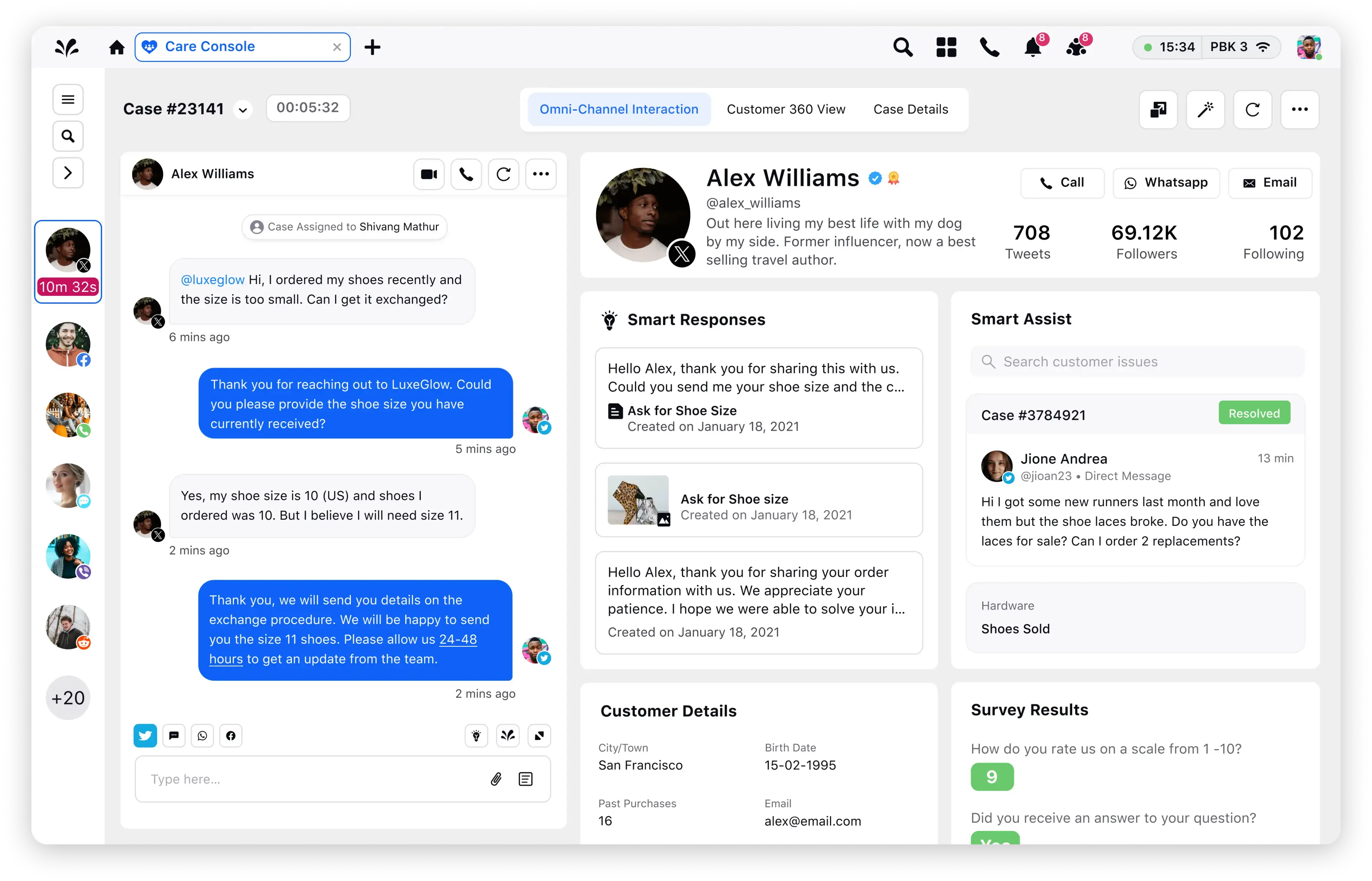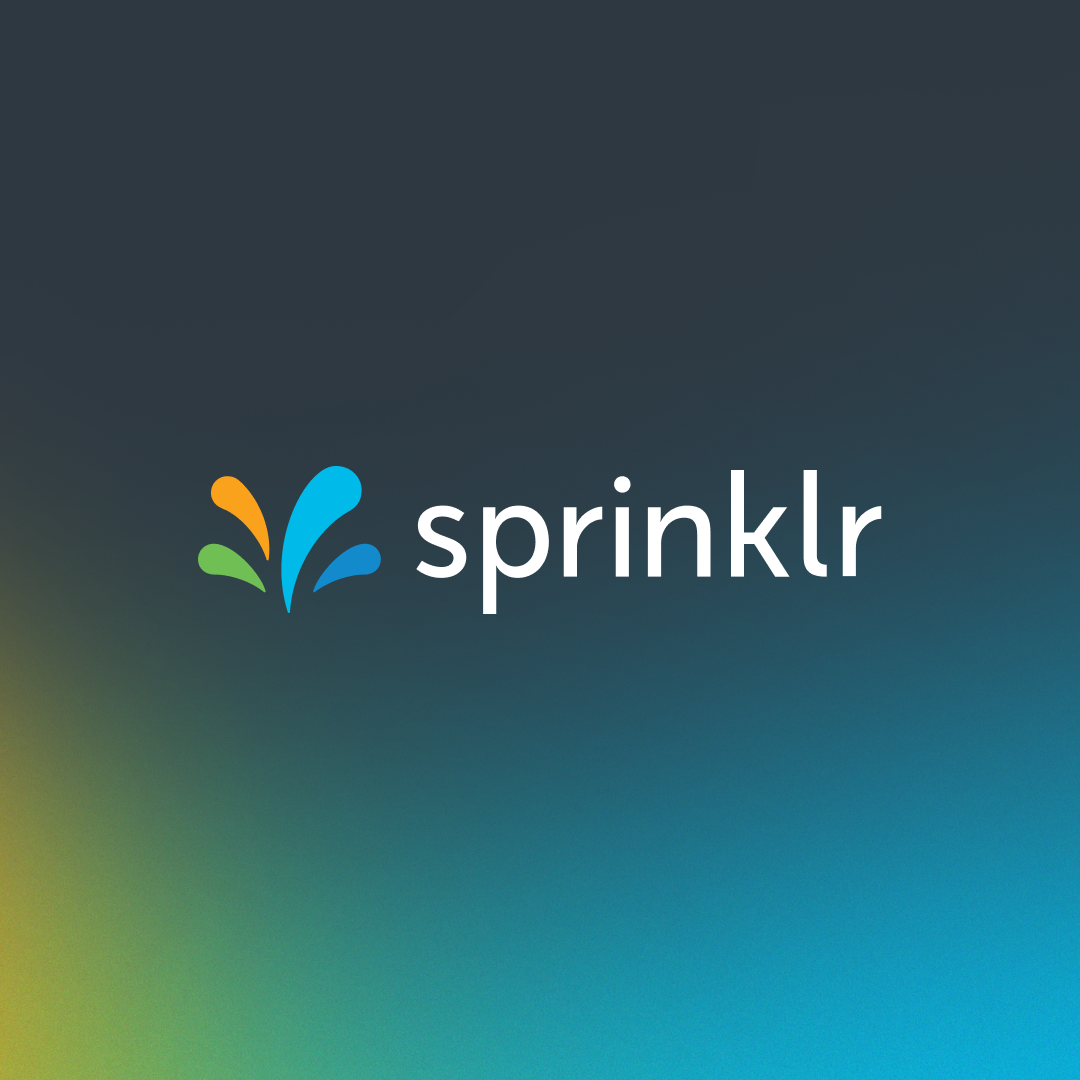The next generation of CCaaS is here
Digital-first customer service, enterprise-scale voice support. Redefine customer service with an AI-powered platform that unifies voice, digital and social channels. Power channel-less interactions and seamless resolution no matter the channel of contact.

Call Center Agent Engagement – A Call Center Manager’s Guide
Even seemingly minor interactions between companies and their clientele today significantly influence brand perceptions.
Call center agents are central in shaping these interactions, serving as the vital link between customers' needs and the brand's offerings. However, despite their pivotal position, call center agents often grapple with disengagement—a challenge exacerbated by the monotony of their work, with implications stretching far beyond the confines of the call center floor.
As businesses increasingly recognize the paramount importance of customer experience in driving growth and fostering customer loyalty, the imperative to cultivate a highly engaged call center workforce has become more pronounced than ever before. Disengaged agents jeopardize service quality and pose a significant risk to customer retention and brand equity. Consequently, driving call center agent engagement has transitioned from mere consideration to a strategic necessity.
Discover how call center agent engagement can make or break your brand in this blog. Learn actionable tips to improve agent engagement and mitigate customer churn.
What is call center agent engagement?
Call center agent engagement refers to the proactive measures and strategies implemented to cultivate a workforce of motivated, committed and satisfied agents who are deeply invested in delivering exceptional customer experiences.
However, despite its paramount importance, businesses often unintentionally overlook or underestimate the significance of call center agent engagement. The relentless focus on call center KPIs and efficiency may overshadow customer service's human aspect, leading to agents' disengagement. This common pitfall can have far-reaching consequences, including decreased productivity, higher turnover rates and, ultimately, diminished customer satisfaction.
While dwindling call center agent performance metrics, increased absenteeism or a pervasive sense of apathy among agents are indicators of disengaged call center agents, here are additional signs that demand immediate attention:
- Decreased participation in training or development programs
- More frequent instances of errors or mistakes in handling customer inquiries
- Limited initiative or willingness to go above and beyond basic job responsibilities
- Complaints or grievances from customers regarding the quality of service provided
- Decreased morale within the team or department.
How do you know if your agents are super engaged
If you're wondering how engaged your call center team is, look out for the following behaviors:
Collaboration: Agents support each other in handling complex issues, sharing call center best practices and working together to exceed targets. For example, they readily offer to cover a coworker's shift if an emergency arises.
Ownership: Agents are responsible for resolving customer inquiries without following a rigid playbook. If standard steps don't work, they seek permission to reasonably bend the rules if they achieve win-win solutions for the customer and the organization.
Growth mindset: Agents consistently self-educate to become more effective problem solvers for customers. They also leverage call center coaching constructively by implementing their manager's guidance.
Engaged and satisfied call center employees are...
8.5x more likely to stay than leave within a year
4x more likely to stay than dissatisfied colleagues
16x more likely to refer friends to their company
3.3x more likely to feel extremely empowered to resolve customer issues
9 Tips for better call center agent engagement
Consider the tips below if you're looking for ways to inculcate the behaviors mentioned earlier. But remember, improving agent productivity and engagement doesn't have a one-size-fits-all solution, so evaluate what works for your call center, industry and agent profile.
1. Listen to your agents
A call center is a stressful environment and agents navigate a continuous stream of inquiries and interactions, often contending with the challenges of dealing with angry customers and demanding workloads. So, as a leader, demonstrating empathy towards your agents is paramount. Providing them with the latest call center technology to automate redundant tasks lightens their workload and shows a commitment to their professional development and job satisfaction.
Moreover, fostering an open culture where feedback is welcomed and actively encouraged creates a supportive environment where agents feel empowered to voice their concerns and opinions, knowing they will be heard and respected. By assuring agents that their hard work is valued and that support is readily available, you can cultivate a sense of trust and loyalty among your team, driving increased call center agent engagement.
2. Accessible resources and tools
While measuring call center productivity is crucial, leveraging the latest innovations and technologies to support your vision is equally vital. With the increasing volume of calls and the adoption of digital customer service, providing agents with omnichannel routing and agent assist functionality becomes imperative to prevent call center agent burnout and ensure efficiency.
Omnichannel routing software intelligently auto-routes customer queries across various customer service channels, matching cases to agents dynamically based on predefined criteria. This ensures a seamless customer experience regardless of the interaction channel.
Agent assist software powered by AI enhances agent performance during live calls by automatically recommending relevant resolved cases, knowledge base and guided workflows based on the context of the conversation. This not only facilitates faster query resolution but also improves overall customer satisfaction.
3. Empowerment with autonomy
Granting agents autonomy in decision-making empowers them to take ownership of customer interactions and resolve issues effectively. By trusting agents to make independent decisions when appropriate, you can demonstrate confidence in their abilities and foster a sense of empowerment. Empowered agents are more likely to feel motivated and engaged, leading to improved customer satisfaction and loyalty.
4. Provide advancement opportunities
Offering clear pathways for career advancement motivates agents to invest in their long-term development and stay committed to the organization. By providing opportunities for promotion, skill development and advancement within the company, you can encourage agents to take ownership of their career paths. When agents see a clear trajectory for growth and advancement, they are more likely to be engaged and motivated in their roles.
5. Recognize and reward achievements
Public recognition is a potent tool for leaders to consistently reinforce excellence, transparency and a growth mindset among their teams. Shining the spotlight on top performers monthly can cultivate a sense of appreciation and camaraderie within the workplace.
Encourage peer nominations to recognize agents who embody teamwork, integrity and dedication. Consider acknowledging these exemplary efforts with small tokens of appreciation, such as gift cards, ceremonies or certificates. Additionally, recognizing the loyalty of long-serving agents can further strengthen their sense of belonging and commitment to your company.
Also, schedule sessions where glowing customer reviews are shared aloud, highlighting the impact of agents' efforts on customer satisfaction. While compensation is essential for agent retention, genuine praise and appreciation are crucial for boosting call center agent engagement.
6. Ongoing training and development opportunities
Continuous learning is critical to keeping call center agents engaged and motivated. By providing regular call center agent training sessions and development opportunities, you can help agents enhance their skills, stay updated on industry trends and feel supported in their professional growth.
Moreover, proactively identifying individual agent strengths and areas for improvement allows for targeted training interventions. These interventions enable agents to handle customer queries efficiently and effectively in their first interactions. This reduces the need for escalations and fosters a sense of accomplishment and positivity among agents as they see tangible improvements in their performance.
7. Cultivate a healthy, fun culture
Delivering exceptional customer service is imperative. But make sure you incorporate mechanisms and activities for your agents where they can let off steam and enjoy some relief from the barrage of calls and messages. Consider surprise giveaways like movie tickets, occasional team potlucks, leadership stopping by stations with sweet treats or even friendly decorating competitions around holidays to humanize the workplace. This will enable agents to sustain high performance over time while preventing call center burnout and plummeting morale in the long run.
8. Work-life balance prioritization
Prioritizing work-life balance is essential for boosting call center agent engagement. Offering flexible call center scheduling options, wellness initiatives and support programs demonstrates a commitment to agents' overall health and happiness. When agents feel supported in balancing their work responsibilities with their personal lives, they are more likely to feel motivated, energized and engaged in their roles.
Do you know: Advanced workforce management software enables you to accurately predict future case volumes, handling times and SLAs across all channels, leveraging historical data. With added flexibility to adjust schedules, you can meet service targets without overburdening your call center workforce. Learn more about workforce management.
9. Promote health and well-being
Prioritizing the health and well-being of call center agents is essential for fostering engagement and sustaining performance levels. Perks like gym or fitness subscriptions, free consultations with nutritionists and access to mental health apps like Wysa or Headspace can help agents manage stress and maintain a healthy lifestyle.
Similarly, creating relaxation zones within the office environment, equipped with amenities such as massage chairs, green spaces and calming interiors, offers agents a space to recharge and de-stress between calls. These initiatives enhance agent morale and energy levels and contribute to sustained performance and well-being.
🎧Listen In: Managing Your Energy to Avoid Burnout, with Neha Saxena
Combat agent disengagement with the right technology
Despite the enduring nature of the call center environment, you must address and mitigate the stressors that agents face daily.
Central to this effort is recognizing the human element within your call center. Agents are integral team members whose well-being profoundly influences customer service quality. Hence, investing in strategies to mitigate agent stress is a moral obligation essential for sustaining performance and fostering engagement.
However, tackling agent stress requires more than empathy and compassion. It demands the integration of the right technological solutions, such as Sprinklr Service, that complement and enhance the human touch within the call center. By leveraging Sprinklr Service, you can simplify and streamline call center workflows, empowering agents to operate more efficiently and effectively.
But don't just take our word for it—experience the difference for yourself. Take the first step towards building agent engagement.
Frequently Asked Questions
Leadership and management styles profoundly influence call center agent engagement. Supportive leadership, clear communication, and opportunities for skill development foster a positive work environment, motivating agents to excel. Conversely, micromanagement, lack of recognition and inadequate support can lead to disengagement and decreased performance among agents.
Signs of low agent engagement in call centers include increased absenteeism, decreased productivity and higher turnover rates. Additionally, disengaged agents may exhibit reduced enthusiasm, lack of initiative and decreased job satisfaction, impacting overall team morale and customer service quality.
AI can positively impact call center agent engagement by automating repetitive tasks, freeing agents to focus on more meaningful interactions. AI-powered tools can also provide real-time support and guidance to agents, enhancing their performance and job satisfaction. However, human-centric factors such as leadership, recognition and support remain crucial in fostering long-term engagement and motivation among agents.


